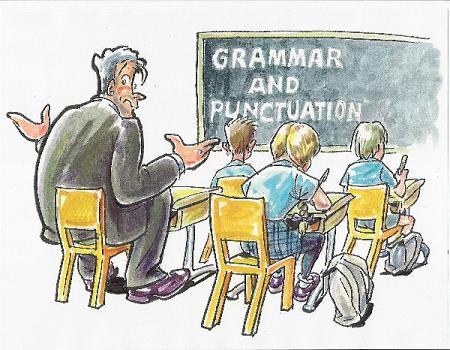People are surprised when I tell them that I have a natural fear of English exams; they are even more surprised to hear that I have scored below average several times in English exams in my Chinese middle school.
Despite the fact that many kids like me used to live in the U.S., they shiver at the thought of English tests in Chinese schools. You may ask: If you speak English almost as well as a native speaker, why should you worry about English tests that are supposed to examine your English abilities?
This, of course, has to do with what is being tested on exams. Before I begin my somewhat attack on the culprit — the teaching of grammar — I should say that the overall quality of English teaching has improved over the past years, with more emphasis on the things that are useful. Still, a problem remains with English exams as well as English teaching.
Why is grammar so important? Doubtless, it is the fabric of the English language. A consistent mastery of grammar shows one’s English ability, and decent grammar in writing often goes with respect and dignity.
But should we have grammar prioritized only because it’s important?
Have you ever wondered why it’s so hard to take up a language after you have grown up? It’s because you have grown up, you no longer follow the steps that babies learn a language. How do babies learn languages? First, they listen. Second, they speak. They don’t begin reading or writing until 5 or 6.
Grammar learning’s main goal is to improve reading and writing. Here in China, the students remember the rules the teachers tell them. They even recite those rules like they recite Chinese poems. But does it help?
In my view, grammar puts Chinese students in an embarrassing position. Usually, the sentences they write are correct grammatically, but it’s clear to any native speaker that these are not how English is supposed to be written. They are correct, and they score, but they are just not “right.” By “right,” I mean the proper way of using English.
In fact, grammar should not be taught by the teachers; instead, it should be discovered by students themselves as they read abundantly in English. Since English books follow the rules of the English language, there is plenty to learn from the books, where grammar is truly alive. After all, my classmates and I never had anyone teaching us Chinese grammar before we spoke and wrote Chinese, and even now most of us are oblivious of its existence!
In a word, there can be no substitute for reading when learning a language. Reading to learn puts you on the offensive, while reading grammar books to learn makes you passive. Just remember that passive learning never really works.
当我告诉别人我害怕英语考试的时候,他们总是很惊讶;当我告诉他们我在中国的初中不止一次在英语考试中下了平均分,他们会更惊讶。
尽管很多像我一样的孩子曾经在美国生活过,他们一想到中国的英语考试就会心慌意乱。你也许会问:既然你们说的英语和美国人的几乎一样好,那么为什么你们还要为一些只是测验英语水平的考试而担忧呢?
这当然是由于考试的内容了。在我向罪魁祸首——语法进行责难之前,我承认中国的英语教学的整体质量在近些年来由很大的进步,因为教学中添加了许多实用的内容。然而,英语教学与考试中依然存在一个问题。
为什么语法如此重要?毫无疑问,它是英语语言的基础与框架。对语法的熟练掌握可以展示一个人的英语水平,而文章中漂亮的语法也可以显示出作者的尊严与对读者的尊重。
但我们是否应该仅仅因语法的重要性而优先强调语法?
你可曾想过,为什么一个人长大后再学一门语言就会非常困难?这是因为当一个人长大以后,他就不再遵循一个婴儿学习语言的步骤。那么婴儿怎样学语言呢?首先,他们听;其次,他们说。他们直到五岁或六岁才会开始阅读和写作。
学习语法的主要目的是提高阅读和写作。在中国,学生往往只是记住了老师教给他们的语法规则,他们甚至可以像背古诗一样把语法规则倒背如流。但是这真的有很大帮助吗?
在我看来,语法将中国学生困于一个尴尬的境地。通常情况下,他们写的英语句子在语法上是正确的,然而对母语是英语的人来说,这些句子并不是英语真正适当的表达。这些句子是对的,他们在考试中可以得分,但是他们并不“对”。“对”在这里要指恰当且地道的英语表达。
其实,语法并不应当由老师教授,它应该在大量的阅读中被学生“发现”。因为英语书均遵循语法,所以书中有很多东西可以学到,毕竟在书里语法是“活”的。毕竟在我们我和同学们开始用中文会话和阅读之前是没有人教我们语法的,甚至到现在我们当中的大多数会忽略中文语法的存在!
总之,在语言的学习中没有任何东西可以代替阅读。在读书中学习语言是一种主动的过程,而埋头苦读语法只能让你被动地学习。请记住:被动的学习永远不会真正奏效。


